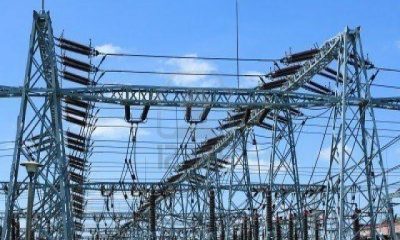Headline
IBEDC, electricity workers sign new condition of service

The management of Ibadan Electricity Distribution Company (IBEDC) and its in-house electricity workers’ unions have signed a new condition of service to improve employees wellbeing and productivity.
Speaking at the signing ceremony at IBEDC office, Ibadan, on Thursday, the Managing Director, IBEDC, Mr Kingsley Achife, said the new condition of service had been carefully drafted.
Achife said the new condition of service would create harmonious balance between management’s goal and employees wellbeing.
He noted that the Electricity Act signed by President Bola Tinubu would bring complexity of business environment and competition in the industry.
Achife, however, urged the workers to out in their best for mutual benefits of IBEDC and the employees.
He added that the new condition of service captured a lot of things such as each employee service, exit package and other non financial benefits to improve the wellbeing of all IBEDC employees.
“We understand that the operating environment for workers is becoming more harsher, the salary has been increased by 25 per cent, what management want from staff is more hard work and partnership so that there will be enough money to support them as it’s supposed to be.
“The pallative package for the employees is going to be dependent on our performance, we must strive to be a viable company, be able to pay generation company and have surplus to support staff when and where necessary,” he said.
In his response, the President, National Union of Electricity Employees (NUEE), Mr Martin Uzoegwu, said the new document gives workers confidence of job security which would go a long way to cement a relationship and partnership between IBEDC and the labour.
Uzoegwu urged IBEDC to ensure that all section of the new condition of service which was co-authored by the union and IBEDC management was implemented effectively.
He charged IBEDC management to always carry unions along in all its policy formulation and implementation.
Uzoegwu noted that outsourcing and casualisation in the work environment threatened employees job and had negative effects on the company’s operations.
According to him, a casual staff with low pay can do anything illegal to survive.
“The last condition of service was signed in 2017 and by procedure it supposed to be every three years, we are unable to carry out its review due to some challenges.
“We thank God that after two years of processing new one, we are able to sign new condition of service today.
“We also appreciate the effort of the management of IBEDC to ensure that this collective bargaining agreement is signed and sealed.
“The new condition of service spells out benefits of employees, dos and don’t, welfare package and necessary disciplinary actions to check theft and other gross misconduct among others,” he said.
Also, the President, Senior Staff Association of Electricity and Allied Companies (SSAEAC), Mr Benedict Chika, called on the IBEDC management to make staff welfare a priority due to the present economy hardship in the country.
This, he said, would serve as a motivation for the employees to improve their level of productivity.
The event featured signing of the new condition of service by the leaders of the unions and the management of the Ibadan Electricity Distribution Company.
Headline
Fagbemi warns against obstructing EFCC from performing its lawful duty

The Minister of Justice, Lateef Fagbemi, SAN has warned against obstructing the Economic and Financial Crimes Commission (EFCC) from carrying out its lawful duty .
Fagbemi’s warning is contained in a statement in Abuja.
“This is a matter of very grave concern, it is now beyond doubt that the EFCC is given power by the law to invite any person of interest to interact with them in the course of their investigations into any matter, regardless of status.
“Therefore, the least that we can all do when invited, is not to put any obstruction in the way of EFCC, but to honourably answer their invitation.
“A situation where public officials who are themselves subject of protection by law enforcement agents will set up a stratagem of obstruction to the civil and commendable efforts of the EFCC to perform its duty is to say the least, insufferably disquieting’’.
He added that running away from the law will not resolve issues at stake but only exacerbate them.
“Nigeria has a vibrant judicial system that is capable of protecting everyone who follows the rule of law in seeking protection.
“I therefore encourage anyone who has been invited by the EFCC or any other agency to immediately toe the path of decency and civility by honouring such invitation instead of embarking on a temporising self-help and escapism.
“This can only put our country in bad light before the rest of the world’’.
He said institutions of state should be allowed to function effectively and efficiently.
“I stand for the rule of law and will promptly call EFCC, and indeed any other agency to order when there is an indication of any transgressions of the fundamental rights of any Nigerian by any of the agencies’’.
NAN reports that the EFCC had on Wednesday warned members of the public that it was a criminal offence to obstruct officers of the Commission from carrying out their lawful duties.
Section 38(2)(a(b) of the EFCC Establishment Act makes it an offence to prevent officers of the Commission from carrying out their lawful duties. Culprits risk a jail term of not less than five years.
The warning , the EFCC said, became necessary against the background of the increasing tendency by persons and groups under investigation by the Commission to take the laws into their hands by recruiting thugs to obstruct lawful operations of the EFCC.
On several occasions, the anti graft agency said, operatives of the Commission have had to exercise utmost restraint in the face of such provocation to avoid a breakdown of law and order.
Headline
Unknown Gunmen Abduct Channelstv Reporter In Port-harcourt

Some unknown gunmen have kidnapped Joshua Rogers, the ChannelsTV reporter in Port-Harcourt, the Rivers State capital.
Politics Nigeria learnt that Rogers was picked up close to his residence at Rumuosi in Port Harcourt and to an unknown destination by the gunmen around 9pm on Thursday, April 11.
The reporter was driving his official ChannelsTV branded car when the hoodlums accosted, pointed a gun at him and took him away in the same vehicle.
Rogers was said to be returning from his official assignment in Government House after a trip to Andoni for a government event when the incident happened.
Already, the gunmen were said to have contacted his wife and demanded a N30million ransom for bis release.
His cameraman confirmed the incident and appealed to his abductors to set him free unconditionally.




















